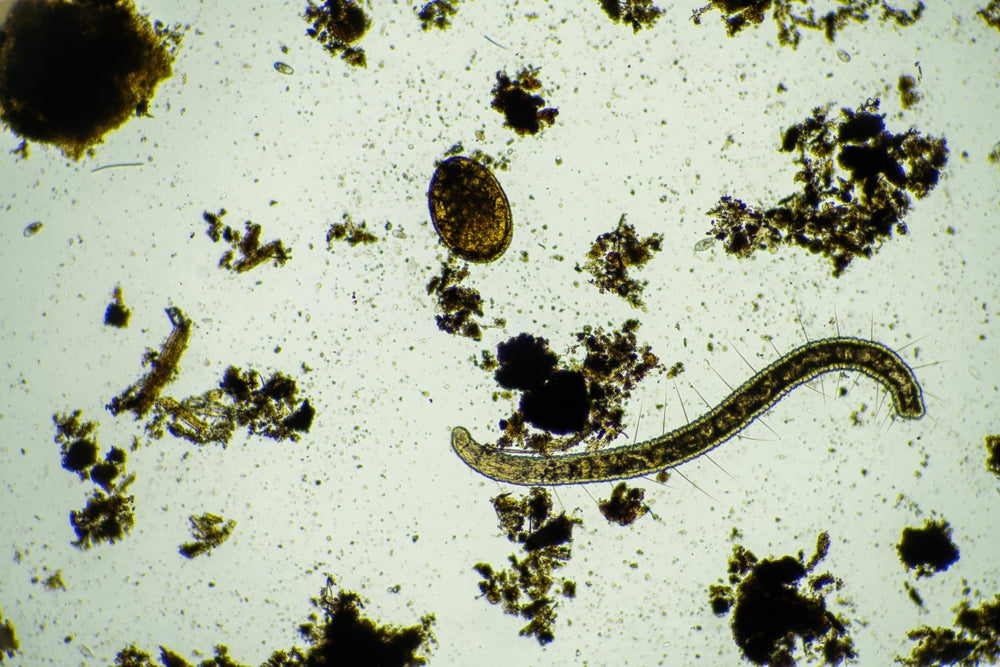
Gut parasites affect millions worldwide, yet many don't know they're carrying these unwanted organisms.
Travel, contaminated water, and certain foods expose you to these microscopic invaders. They live in your digestive tract, feeding off your nutrients and causing health problems that extend far beyond stomach troubles.
When parasites invade, they disrupt the balance in your gut microbiome and trigger symptoms from bloating to chronic fatigue. Your second brain becomes compromised, affecting everything from mood to immune function.
With proper knowledge about symptoms and treatment, you can protect yourself and restore your gut health.
In this article, you'll learn about the types of parasites that affect your gut, how to recognise infection symptoms, and discover proven treatment and prevention strategies to protect your digestive health.
What Gut Parasites Exist?
Two Main Types
Protozoa are single-celled organisms like Giardia lamblia and Cryptosporidium. These microscopic parasites multiply rapidly in your intestines and spread easily through contaminated water.
Helminths include roundworms, tapeworms, and flukes that grow larger and live longer in your digestive tract.
Modern Outbreak Examples
The 1993 Milwaukee Cryptosporidium crisis showed how vulnerable modern water systems can be.
Over 400,000 people fell ill when the parasite contaminated the city's water supply. Many experienced severe diarrhoea, vomiting, and dehydration. Some immunocompromised individuals died from the infection, highlighting how serious parasitic infections can become.
Bergen, Norway faced a similar outbreak in 2004 when Giardia infected thousands through their water system.
The long-term consequences revealed how parasites affect gut health for months or years after initial infection. Many survivors developed chronic digestive issues, food sensitivities, and ongoing fatigue.
While not becoming outbreaks, parasites can lurk in the background even in developed countries. For example, cryptosporidium cases nearly doubled in England in 2023 compared to 2022.
Understanding these real-world risks makes it crucial to recognise the symptoms and understand how parasites damage your gut health.
Parasite Symptoms and Gut Impact
Parasite infections cause both short-term and long-term symptoms that disrupt your daily life.
Short-Term Symptoms
Persistent diarrhoea, severe bloating, stomach cramps, and malabsorption problems signal something isn't right in your gut. You might notice undigested food in stools, unexplained weight loss, or constant fatigue despite adequate rest.
Parasites disrupt your microbiome by competing with beneficial bacteria for nutrients and space. They create toxic waste products that inflame your intestinal lining and alter the gut environment. This bacterial imbalance affects digestion, nutrient absorption, and your body's ability to fight off infections.
Your immune system recognises parasites as invaders and launches inflammatory responses to eliminate them. This inflammation affects gut lining integrity and can trigger autoimmune reactions that extend beyond digestive symptoms.
Long-Term Symptoms
Long-term consequences include post-infectious IBS, where digestive sensitivity continues months after parasite elimination. Your gut remains hyperactive and reactive to foods that previously caused no problems.
Many people develop lasting food intolerances, chronic pain, and ongoing digestive unpredictability that requires careful management.
Supporting your gut during and after parasite treatment becomes essential to avoid these symptoms. Let's explore prevention and treatment strategies in the next section.
Prevention and Treatment Strategies
Water safety forms your first line of defence against parasites. Drink filtered or bottled water when travelling, especially in areas with questionable sanitation.
Avoid ice cubes, raw vegetables, and fruits you can't peel yourself in high-risk locations. These simple precautions prevent most waterborne parasite infections.
Food hygiene practices protect you from foodborne parasites. Wash hands thoroughly before eating, cook meat to proper temperatures, and avoid raw or undercooked seafood.
Wash fruits and vegetables with clean water, even if you plan to peel them. Cross-contamination in kitchens spreads parasites between foods.
Medical treatments vary depending on the specific parasite type. Antiparasitic medications like metronidazole treat protozoan infections, while different drugs target helminth parasites.
Your doctor will identify the specific organism through stool testing before prescribing appropriate medication. Treatment duration ranges from single doses to several weeks.
Supportive recovery approaches help restore gut health after parasite elimination. Probiotics replenish beneficial bacteria, while anti-inflammatory foods reduce ongoing irritation. Avoiding processed foods, sugar, and alcohol during recovery prevents feeding any remaining parasites.
Natural gut-healing support complements medical treatment and speeds recovery. Anti-inflammatory plants like those found in Cosmic Hue support your body's natural healing processes and help restore healthy gut function.
Conclusion
Gut parasites are more common than you think, even in developed countries with modern sanitation systems.
These microscopic invaders disrupt your gut microbiome, cause immediate symptoms like bloating and diarrhoea, and can lead to long-term digestive issues including IBS.
Prevention through water safety and food hygiene remains your best defence, while medical treatment combined with supportive gut healing approaches helps restore your digestive health after infection.
Try Cosmic Hue today to support your gut health.
Author: Manny is the founder of Fifth Ray and certified Gut Health Coach. After battling Crohn's Disease for 16 years he transformed his gut health through plant-based healing. His story has been featured on BBC, ITV, and Daily Mail.
Please note this information is for educational purposes only, not medical advice. Cosmic Hue is not intended to diagnose, treat, cure, or prevent any disease. Always consult your healthcare provider before making changes to your health routine.

